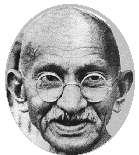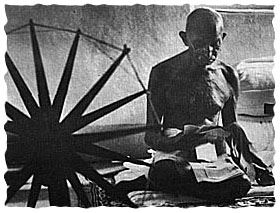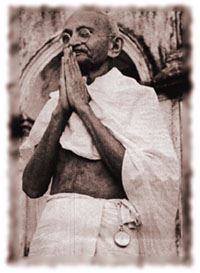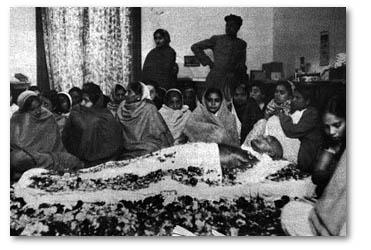 |
Mohandas K. Gandhi
Oct 2, 1869 - Jan 30, 1948
Gandhi was born in India to Hindu parents. His father was an advisor to the local ruler. At the age of 13, Gandhi and Kasturbai Makanji married by the arrangement of their families. When he was 19, Gandhi went to London to study law. By 1891, he was enrolled in the High Court of London. However, he returned to India later that year. He didn't have a very successful experience in practicing law in India so he took an offer to be a legal advisor in South Africa, a job he remained in for 20 years.
 |
His awareness of the European's discrimination against Indians began when he first arrived in South Africa and was thrown out of a first-class railway compartment car though he was holding the appropriate ticket. From this period of political awakening he emerged as a leader of the Indian community in South Africa, and practiced nonviolent resistance to the government. He struggled to claim the rights of the Indian immigrants by protesting oppressive legislation and executive measures. In doing so, Gandhi realized the power of passive resistance against injustice, which is known in Hindi as satyagraha or "truth force." Due to the protests he led he was frequently jailed. By the time he returned to India the lives of Indians in South Africa had changed radically.
 |
When he returned to India with his family in 1915, he joined India's long struggle for independence from Great Britain. He continued practicing satyagraha with religious tolerance. He took action to eliminate the untouchable caste in the Indian society. Wherever he saw violence or injustice: in the fights between the Hindu and Muslim, in the unjust treatment of members of the lower castes, in the tension between British colonizer and native Indian, he would respond by fasting until the violence and problems stopped. In 1947, upon the strength of human will, India achieved independence from Britain.
After the departure of the British, India was partitioned into Hindu India and Muslim Pakistan, which immediately turned against each other. Gandhi spent months trying to settle the violence between the two religions.  During that period he fasted almost to the point of death in order to settle a riot, which seriously destroyed his health.In 1949, while he sat on a podium of a garden for the evening prayer, Gandhi was shot three times in the chest. Before his death, his hands still folded like a prayer, Gandhi blessed his assassin: "He Ram! He Ram!".
During that period he fasted almost to the point of death in order to settle a riot, which seriously destroyed his health.In 1949, while he sat on a podium of a garden for the evening prayer, Gandhi was shot three times in the chest. Before his death, his hands still folded like a prayer, Gandhi blessed his assassin: "He Ram! He Ram!".
Quotes:
|
"Gandhi was inevitable. If humanity is to progress, Gandhi is inescapable. He lived, thought and acted, inspired by the vision of humanity evolving toward a world of peace and harmony. We may ignore Gandhi at our own risk." |
|
"Generations to come will scarce believe that such a one as this ever in flesh and blood walked upon this earth." |
Page created on 8/27/2011 12:00:00 AM
Last edited 8/27/2011 12:00:00 AM
References:
Engaged Buddhist Dharma Page